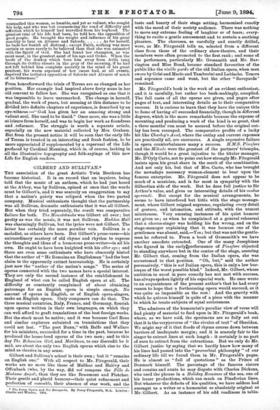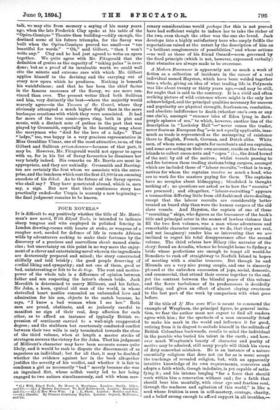GILBERT AND SULLIVAN.*
4I'wz association of the great Artistic Twin Brethren has become historical. It is on record that an inquirer, being told that the music of an anthem, which he had just heard at the Abbey, was by Sullivan, opined at once that the words must be Gilbert's, and it was scarcely an exaggeration to say that a nation's gaiety was eclipsed when the two parted -company. Musical enthusiasts thought that the partnership was all Sullivan, dramatic enthusiasts that it was all Gilbert. But when they tried separately, the result was comparative failure for both. The Mountebanks was Gilbert all over ; but pretty as was the music, it was not Sullivan. Haddon Hall was charmingly Sullivan, but the lyrics were not Gilbert The latter has certainly the more peculiar vein. Sullivan is a melodist, as others have been. But Gilbert's prose-verse—his extraordinary mastery of old rhyme and rhythm to express the thoughts and ideas of a humorous prose-writer—is all his -own. He ought to have been knighted with his alter ego ; and there are even some enthusiasts who have obscurely hinted that the author of "He Remains an Englishman" had the best -claim to the apparently extinct laureateship. He is certainly just now the "author of the nation's songs." The series of operas connected with the two names have a special interest. They are only the second instance of the establishment in England of what can be called English opera at all. The difficulty so constantly complained of about obtaining patronage for an English opera is simple enough. No amount of operas in English, or of English opera-singers, make an English opera. Only composers can do that. The three musical countries, Italy, France, and Germany, flourish apon operas written in their own languages, on which they can well afford to graft translations of the best foreign works. But the stock must be native; and it was because Carl Rosa and similar explorers subsisted on translations that they could not last. "The poet Bunn," with Balfe and Wallace for his ministers, succeeded for a time in the past, because he produced the home-bred operas of the two men; and to this day The Bohemian Girl, and Maritana, to our discredit be it said, are about the only two English operas which rise to the mind as classics in any sense.
Gilbert and Sullivan's school is their own ; but it "remains an English one." With all respect to Mr. Fitzgerald, their works are no more like those of Meilhac and Halevy and Offenbach (who, by the way, did not compose the Fille de Madame Angot), than they are like Beaumont and Fletcher. Their gentle and placid humour—their quiet refinement and perfection of ensemble, their absence of star work, and the • The Savoy Opera and the Savoyard% By Percy Fitzgerald, M.A. London : Matto and Wham. 1594. taste and beauty of their stage setting, harmonised exactly with the mood of their society audience. There was nothing to move any extreme feeling of laughter or of tears; every- thing to excite a gentle amusement and to sustain a soothing pleasure. The choruses, so carefully and exactly drilled, were, as Mr. Fitzgerald tells us, selected from a different class from those of the ordinary show-theatre, and their members were often promoted to the first rank; and some of the performers, particularly Mr. Grossmith and Mr. Bar- rington and Miss Bond, became standard favourites of the public like the vieille garde of the old Italian opera, when men swore by Grisi and Mario and Tambnrini and Lablache. Tenors and sopranos came and went, but the other " Savoyards ' remained.
Mr. Fitzgerald's book is the work of an evident enthusiast, and it is carefully, but rather too book-makingly, compiled. The full casts of all the operas are given, and pages after pages of text, and interesting details as to their comparative success. It is curious to learn that they have the unique title to fame of having all succeeded financially, though in different degrees, which is the more remarkable because the expense of mounting and producing a work of the kind is so great, that a three months' ran must be secured before the original out- lay has been recouped. The comparative profits of a lucky hit like Charity's Aunt, where the outlay and current expenses are practically nil, are enormous. A single expensive failure in opera counterbalances many a success. H.M.S. Pinafore and the Mikado were the greatest of the partners' triumphs, though it would be a great injustice to the titular manager, Mr. D'Oyly Carte, not to point out how strongly Mr. Fitzgerald insists upon his great share in the merit of the combination. And not only his, but that of Mrs. Carte, who has brought the nowadays necessary woman-element to bear upon the famous enterprise. Mr. Fitzgerald does not appear to be much of a musician, and is far most in sympathy with the Gilbertian side of the work. But he does full justice to Sir Arthur's value, and gives us interesting details of his modus operandi. But except for the musical arrangements, he seems to have interfered but little with the stage manage- ment, where Gilbert reigned supreme, regulating every detail of gesture, and intonation, and attitude, with the utmost minuteness. -Very amusing instances of his quiet humour are given us ; as when he complained at a general rehearsal that a chorus-singer was holding his fan wrong, and on the stage-manager explaining that it was because one of the gentlemen was absent, said,—Yes ; but that was not the gentle- man he referred to. From a book of Grossmith's we have another anecdote extracted. One of the many Josephines who figured in the earlyberformance of Pinafore objected to standing anywhere but in the centre of the stage, assuring Mr. Gilbert that, coming from the Italian opera, she was accustomed to that position. "Oh, but," said the author persuasively, "this is not Italian opera, this is only a low bur- lesque of the worst possible kind." Indeed, Mr. Gilbert, whose ambition to excel in pure comedy has not met with success, has always spoken lightly of his especial work. He once wrote to an acquaintance of the present author's that he had every reason to hope that a forthcoming opera would succeed, as it was quite as impossible as the rest ! And the gravity with which he quizzes himself is quite of a piece with the manner in which he treats subjects of equal seriousness.
The admirers of the humourist's peculiar view of verse will find plenty of material to feed upon in Mr. Fitzgerald's book, where, as we have said, the specimens are so fully set out that it is the veryireverse of "the rivulet of text" of Sheridan. We might say of it that floods of rhyme course down between barriers of inadequate margin; and it is scarcely fair to the singer to extract lines at such length : it certainly is no part of ours to extract from the extractions. But we only do Mr. Gilbert justice by saying that we hardly knew how many of his lines had passed into the "proverbial philosophy " of our ordinary life till we found them in Mr. Fitzgerald's pages. He is almost as "full of quotations" as the Prince of Denmark himself. The parentage of the famous sisters and cousins and mints he may dispute with Charles Dickens, who used the phrase in a Holiday Romance of the sea, one of his lesser productions, which ran much on Pinaforian
But whatever the defects of his qualities, we have seldom had amongst us a writer or a humourist so absolutely original as Mr. Gilbert. As an instance of his odd readiness in table. talk, we may cite from memory a saying of his many years ago, when the late Frederick Clay spoke at his table of the "Opera..Comique " Theatre then building—oddly enough, the destined scene of his future triumphs, for the Savoy was built when the Opera-Comique proved too small—as "too beautiful for words." "Oh," said Gilbert, "then I won't write any." Clay and he had just agreed to write an opera together. We quite agree with Mr. Fitzgerald that the definition of genius as the capacity of "taking pains " is over. done ; but as a proof of its invaluable worth we could well cite the minute and extreme care with which Mr. Gilbert applies himself to the devising and the carrying out of every new opera which he produces. Nothing is beneath his watchfulness ; and that he has been the chief factor in the famous successes of the Savoy, we are more con- vinced than ever. The present writer liked both Sullivan and him, very distinctly the best—where the majority would scarcely agree—in the Yeomen of the Guard, where they obviously attempted a much higher flight than in the more burlesque creations with which they were associated. It had far more of the true comic-opera ring, both in plot and music, with a distinct note of pathos in the part that was played by Grossmith, especially in the haunting song about the merryman who "died for the love of a ladye." That " ladye," too, was happy in a very gracious representative in Miss Geraldine Ulmar, one of the most attractive, to us, of the Gilbert and Sullivan prima-donnas—because of that part, it may be. However, Mr. Fitzgerald would not appear to agree with us, for in his list of Savoy favourites he dismisses her very briefly indeed. His remarks on Mr. Barrie are most in- appropriate, and they are unkindly. Grossmith and Balling- ton are certainly the first whom we associate with the enter- prise, and the luncheon which cost the first 21,800 is an amusing anecdote of his debut. As to the future of the Savoy operas, who shall say They have penetrated abroad, which is, men say, a sign. But now that their continuous story has practically ended—for Utopia is scarcely a new beginning— the final judgment remains to be known.







































 Previous page
Previous page